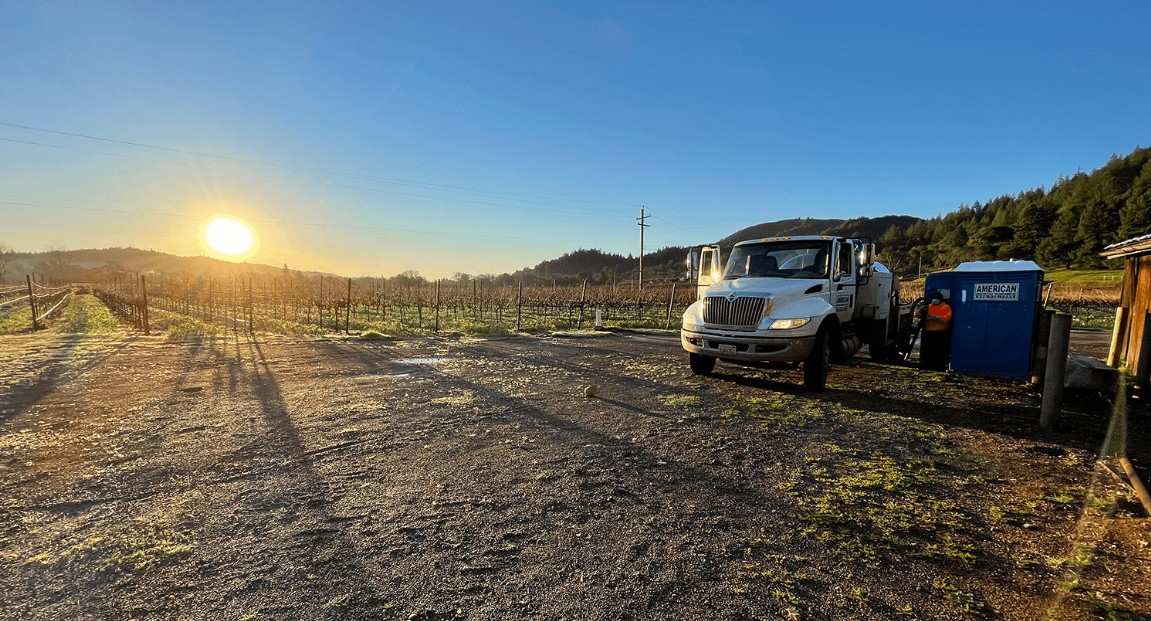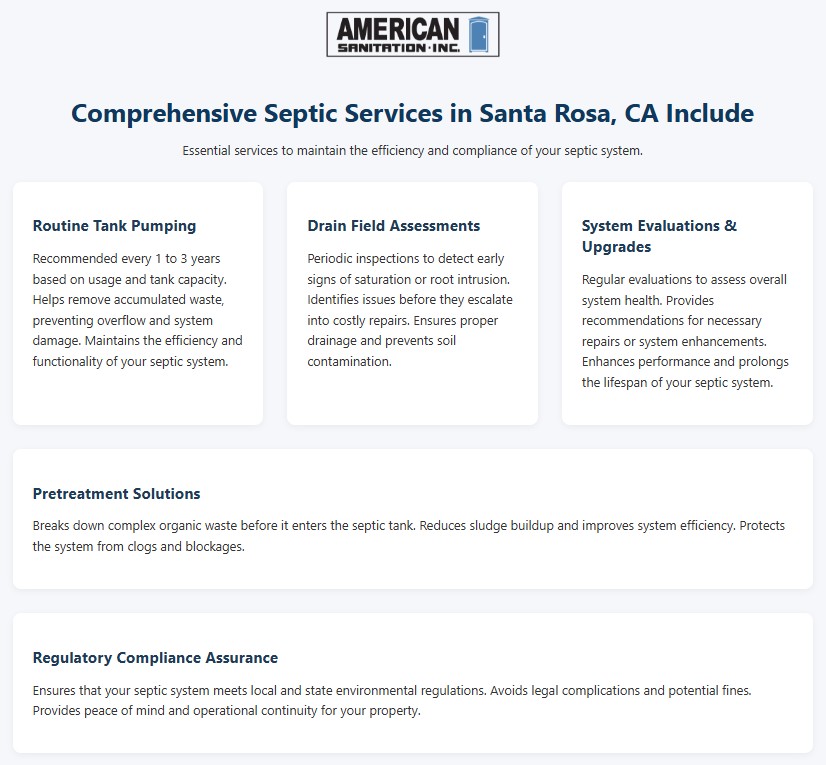Finding a Reliable Septic Service Provider in Santa Rosa, CA: Tips and Red Flags
When seeking a reliable septic service provider in Santa Rosa, CA, it's crucial to prioritize companies with a strong local reputation and clear customer testimonials. American Sanitation Inc. exemplifies this reliability by providing comprehensive septic services, extending their high-quality offerings such as portable restrooms and sanitation sinks even to nearby areas, including those needing septic service in Santa Rosa, CA. Always be cautious of companies that subcontract equipment or fail to offer transparent pricing—these are significant red flags. A trustworthy septic service provider, like American Sanitation Inc., proudly employs dedicated professionals committed to exceptional customer service, ensuring timely deliveries and direct control over all operations. For dependable and professional assistance, you can reach out to their helpful team directly at (707) 554-8258.

- Verify Professional Credentials
- Licensing: Confirm that the company possesses all necessary state and local licenses. In California, septic service providers must be licensed by the Contractors State License Board (CSLB), ensuring adherence to industry standards and regulations.
- Insurance: Ensure the provider carries adequate liability insurance to protect against potential damages during service operations.
- Assess Experience and Expertise
- Industry Tenure: Seek out companies with a substantial history in the septic service industry. For instance, AAA Action Septic Service boasts over 52 years of experience, indicating a proven track record of reliability and quality service.
- Specialization: Confirm that the provider has experience with your specific type of septic system, whether it's conventional, aerobic, or another variant.
- Evaluate Reputation and Customer Feedback
- Online Reviews: Analyze reviews on platforms such as Yelp, Google Reviews, and the Better Business Bureau (BBB). Consistent positive feedback and high ratings are indicators of customer satisfaction.
- Testimonials: Request references or testimonials from previous clients to gain insights into their experiences and the company's service quality.
- Compare Pricing and Service Offerings
- Detailed Estimates: Obtain comprehensive quotes from multiple providers, ensuring they include a breakdown of services offered. Be cautious of unusually low estimates, which may indicate subpar service or hidden fees.
- Service Inclusions: Clarify what is encompassed in the quoted price, such as inspections, pumping, repairs, and maintenance.
- Confirm Range of Services
- Comprehensive Solutions: Opt for providers offering a full spectrum of septic services, including installation, routine maintenance, emergency repairs, and inspections. This ensures continuity and familiarity with your system over time.
- Ensure Regulatory Compliance
- Adherence to Laws: Verify that the company complies with all relevant environmental regulations and guidelines. Non-compliance can lead to legal issues and environmental harm.
- Permits: Ensure the provider obtains any necessary permits for septic work, demonstrating their commitment to lawful and safe operations.
- Observe Professionalism and Customer Service
- Responsiveness: A reliable provider should promptly address inquiries and be available for emergency services.
- Transparency: They should openly discuss their processes, pricing structures, and be willing to answer all your questions thoroughly.
- Recognize Warning Signs
- Lack of Proper Credentials: Avoid companies that cannot provide proof of licensing or insurance.
- Negative Feedback: Consistent negative reviews or unresolved complaints are red flags.
- Unclear Estimates: Be wary of providers who offer vague or incomplete estimates, as this may lead to unexpected costs.
- Know When to Seek Professional Assistance
- Slow Drains: If sinks, bathtubs, or toilets are draining more slowly than usual, it could indicate a septic system issue.
- Unusual Odors: Persistent or strong odors around the septic tank or drain field can be a sign of problems.
- Backups: If wastewater backs up into your home, it's a serious sign that requires immediate attention.
Top Reasons Your Business Needs Regular Commercial Septic Service
Maintaining a commercial septic system isn’t just routine—it’s essential for protecting the long-term health of your property, your staff, and your customers. Unlike residential systems, commercial septic setups are subjected to heavier usage and are built with more complex components, making regular service a critical part of facility management. Here’s why scheduled septic maintenance should never be overlooked:Prevents Costly Breakdowns and Major Repairs
Commercial septic systems are under constant demand, processing thousands of gallons of wastewater daily. This heavy use increases the risk of blockages, leaks, and mechanical failures. Without routine pumping and inspections, small issues like clogged pipes, slow drains, or minor cracks can develop unnoticed until they lead to system failures, contaminated soil, or even total drain field collapse. Proactive maintenance helps detect these problems early, saving time, resources, and operational downtime.Improves System Performance and Extends Lifespan
A well-maintained commercial septic system can reliably function for several decades. Regular servicing, including tank pumping, grease trap cleaning, and inlet/outlet inspections, ensures that wastewater flows smoothly without overburdening the system. Proper care not only enhances system efficiency but also reduces the likelihood of premature system failure, which can otherwise result in the need for costly overhauls and emergency repairs.Supports Health and Environmental Compliance
Commercial properties are subject to stringent environmental and public health regulations related to wastewater management. A poorly maintained septic system can pose serious health risks, including groundwater contamination and exposure to harmful bacteria. Failing to comply with local and state regulations can lead to violations, legal liabilities, and environmental penalties. Scheduled maintenance helps ensure that septic systems meet sanitation standards and operate safely and responsibly.Prevents Business Interruptions
Septic issues can severely disrupt daily operations. Backups, foul odors, slow drains, or visible wastewater pooling are not only inconvenient—they can drive away customers, impact employee productivity, and even force temporary closures. Businesses in hospitality, healthcare, and retail are particularly vulnerable to reputational damage from unsanitary conditions. Regular inspections and pumping schedules significantly reduce the risk of such incidents, keeping your business running without interruptions.Meets the Specific Demands of Commercial Systems
The demands placed on a commercial septic system differ significantly from those of a residential one. Larger tank capacities, higher daily wastewater output, and the introduction of materials like grease, fats, and cleaning chemicals all contribute to unique maintenance needs. Commercial systems may also require grease trap servicing, lift station checks, and drain field monitoring—services specifically designed to address the complexity of larger-scale wastewater treatment systems.Utilizes Specialized Equipment and Expertise
Commercial septic maintenance requires more than basic tools and general knowledge. It involves the use of high-capacity pump trucks, hydro-jetting technology, video inspection systems, and flow monitoring devices. Certified technicians use these tools to locate hidden issues, remove blockages, and ensure every component—from the tank to the distribution box—is functioning properly. Access to this level of expertise ensures that maintenance is thorough and compliant with industry standards.Promotes Responsible Waste Disposal
Beyond maintenance, proper disposal of septic waste is an environmental responsibility. Commercial wastewater often contains a higher concentration of solids, grease, and chemical byproducts, all of which must be handled safely and in accordance with local regulations. Professional service providers ensure that septic waste is disposed of at approved treatment facilities, reducing environmental impact and protecting public health.Enables Data-Driven Maintenance Through Flow Monitoring
Advanced flow monitoring systems can provide real-time data on a facility’s wastewater usage patterns. By tracking fluctuations in water flow and identifying peak usage periods, businesses can fine-tune their septic maintenance schedules to align with actual demand. This data-driven approach not only prevents overuse and strain on the system but also optimizes maintenance frequency, reducing long-term risks and unnecessary costs.Construction & Winery Septic Maintenance: Why Commercial Septic Service in Santa Rosa, CA Is Essential
In Santa Rosa, CA, businesses such as wineries and construction sites must prioritize commercial septic system maintenance to manage the substantial wastewater volumes they produce. American Sanitation Inc. offers specialized services tailored to these industries, ensuring efficient and compliant wastewater management.Importance of Commercial Septic Maintenance
- Increased Wastewater Generation: Wineries and construction sites typically produce significantly more wastewater than residential properties. For example, a single winery can generate thousands of gallons of wastewater daily during peak production periods, necessitating robust septic systems designed to handle such capacity.
- System Design and Complexity: Commercial septic systems often incorporate larger tanks, expansive drain fields, and advanced pumping mechanisms to accommodate complex waste streams. Regular assessments are crucial to ensure these components function effectively and meet industry standards.
- Preventing System Overload and Backups: Consistent maintenance, including routine pumping and inspections, is vital to avert system overloads that can lead to backups. Such incidents not only disrupt operations but can also result in environmental violations and hefty fines.
- Risks of Neglected Maintenance: Failure to maintain septic systems can lead to the accumulation of sludge and scum, diminishing system efficiency. This neglect can cause system failures, sewage overflows, and potential contamination of local groundwater sources.
Industry-Specific Considerations
- Wineries: The winemaking process generates wastewater rich in organic materials and varying pH levels. Specialized maintenance strategies, including pretreatment solutions, are essential to manage these unique waste characteristics and protect the septic infrastructure.
- Construction Sites: These sites often produce large volumes of water laden with sediments and construction debris. Without regular maintenance and sediment management practices, septic systems can become clogged or damaged, leading to operational delays and increased costs.
Advantages of Professional Septic Services
- Expertise and Compliance: Engaging professional septic service providers ensures that systems are maintained by experts equipped with the necessary knowledge and tools. They ensure adherence to local environmental regulations, helping businesses avoid legal complications.
- Cost Efficiency: Investing in regular maintenance is financially prudent. Preventative care is considerably less expensive than addressing major system failures, which can involve extensive repairs or complete system replacements.

Comprehensive Septic Services Include
- Routine Tank Pumping: It's recommended that commercial septic tanks undergo pumping every 1 to 3 years, depending on usage and capacity, to remove accumulated waste and maintain optimal function.
- Drain Field Assessments: Regular inspections of the drain field can identify early signs of issues such as soil saturation or root intrusion, allowing for timely interventions.
- System Evaluations and Upgrades: Periodic professional evaluations can detect potential problems and suggest necessary repairs or system enhancements to improve performance and longevity.
- Pretreatment Solutions: Implementing pretreatment processes can effectively break down complex organic waste before it enters the septic system, reducing sludge buildup and enhancing overall efficiency.
- Pretreatment Solutions: Implementing pretreatment processes can effectively break down complex organic waste before it enters the septic system, reducing sludge buildup and enhancing overall efficiency.
- Regulatory Compliance Assurance: Professional services ensure that all aspects of the septic system comply with current local and state regulations, providing businesses with peace of mind and operational continuity.





